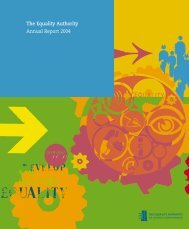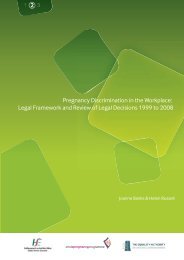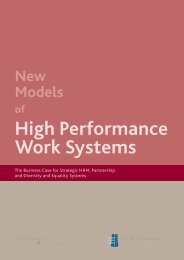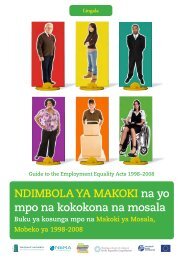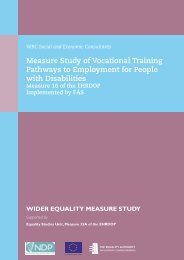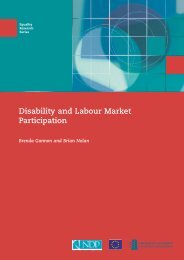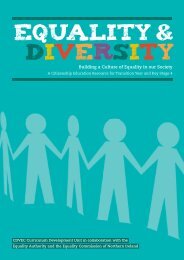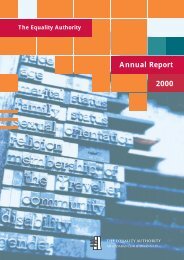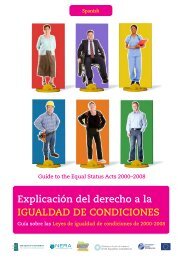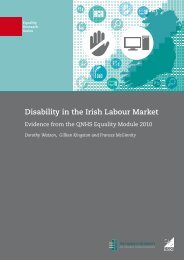Mainstreaming Equality Conference Report.pdf - Equality Authority
Mainstreaming Equality Conference Report.pdf - Equality Authority
Mainstreaming Equality Conference Report.pdf - Equality Authority
You also want an ePaper? Increase the reach of your titles
YUMPU automatically turns print PDFs into web optimized ePapers that Google loves.
page 4<strong>Mainstreaming</strong> <strong>Equality</strong>: Models for Statutory Duty – <strong>Conference</strong> <strong>Report</strong>page 5<strong>Mainstreaming</strong> <strong>Equality</strong>: Models for Statutory Duty – <strong>Conference</strong> <strong>Report</strong><strong>Mainstreaming</strong> <strong>Equality</strong>Foundations in the Irish ContextBy Niall Crowley, Chief Executive Officer,the <strong>Equality</strong> <strong>Authority</strong>IntroductionThese are dramatic and exciting times in thepursuit of equality across Irish society.There is anew energy and a new ambition evident amongso many different sectors and individuals. Newlegislation with its coverage of nine differentgrounds has placed us at the cutting edge ofEuropean initiative in this regard. Newinstitutions and new resources are making theircontribution.Yet we know we need to go further.We havelegislation against discrimination on the genderground in the workplace for nearly threedecades. Still gender discrimination demonstratesa persistence. It remains the dominant ground inthe implementation of the new Employment<strong>Equality</strong> Act.We have cutting edge equality legislation. Stillwe can look to other jurisdictions – and we willduring the conference – and know we could gofurther.A new generation of equality legislationis emerging that combines the traditionalprohibition on discrimination with innovativeduties on the public and private sectors to bemore proactive in the pursuit of equality. Just aswe have taken a leadership position on equalityissues we find we have some catching up to do.Progress in Northern Ireland is a particular casein point where there is a statutory duty ondesignated public sector bodies to have dueregard to the need to promote equality ofopportunity in the carrying out of theirfunctions.This is particularly relevant given thecommitment in the Belfast Multi-PartyAgreement to an equivalence of rights northand south.The potential to go further in the developmentof our equality legislation is clearly emerging.Significant developments are evident on thegender ground as gender mainstreamingbecomes a dimension to our NationalDevelopment Plan.Anti-poverty strategies haveevolved to include a model of poverty proofingin the public sector that includes a focus oninequalities likely to lead to poverty.The socialpartners through their various institutions haveput forward new thinking and new proposals inrelation to mainstreaming equality.Aconstituency committed to moving towardsthis new generation of equality legislation isslowly emerging.There is an important external stimulus tochange, coming from the European Union, in thenew Gender Equal Treatment Directive.TheDirective requires members states to ‘activelytake into account the objective of equalitybetween men and women when formulating andimplementing laws, regulations, administrativeprovision, policies and activities’ in the areascovered by the Directive.This should provide thebasis for a new public sector duty to promoteequality in our equality legislation.The Directivealso requires members states to ‘encourageemployers to promote equal treatment for menand women in the workplace in a planned andsystematic way’.This raises the possibility of astatutory duty tailored to the private sector.This is the context in which we discussmainstreaming equality.To date this has been verymuch a minority interest. Howevermainstreaming equality is moving centre stage asthe key mechanism to address the persistentinequality in our society.<strong>Mainstreaming</strong>The European Commission recently carried outa survey across the EU members states toexplore how officials responsible for formulatingand implementing public employment policies,and the social partners, perceived the approachto gender mainstreaming.The results were veryencouraging in finding that gender mainstreamingapproaches were highly regarded for theircapacity to:-• Focus on the causes of problems.• Raise awareness and challenge indifferenceabout equality issues.• Give momentum to deliberations on equalopportunities.• Sustain a long term approach to equalityissues.The survey found that the concept had beencommunicatied to the officials most directlyresponsible for public employment policies andequal opportunities. However the concept wasless understood elsewhere and there was achallenge to clarify the concept.<strong>Mainstreaming</strong> on the single ground of genderhas been usefully defined in the Irish context interms of the ‘incorporation of genderconsiderations into all policies, programmes,practices and decision making so that at everystage of development and implementation ananalysis is made of the effects on women andmen and appropriate action is taken’.A similardefinition had been applied by Chris McCruddento a wider equality mainstreaming in terms of arequirement 'that government and public bodiesshould attempt to weave policies of equality andnon-discrimination into the fabric of decisionmaking across all spheres of government.’ 1In Ireland there has been a confusion overdifferent types of mainstreaming. Over theyears significant EU and exchequer funds havebeen committed to pilot projects.This hasbeen accompanied by commitments tomainstream learning from the projects intonational policy and practice.Then there havebeen strategies to mainstream particulargroups of people into programmes or areas ofprovision. Recently for example, there has beena strategy to bring people with disabilities intomainstream provision of labour marketprogrammes. However when we talk ofmainstreaming equality we talk aboutmainstreaming a particular focus into policymaking and programme design.Themainstreaming of a focus on equality istherefore about:-• Establishing clear equality objectives in theparticular policy or programme area.• Assessing the potential impact of the policyor programme at design stage on theseequality objectives and on those groups whichexperience inequality.• Securing the participation of these groups andtheir organisation in carrying out this impactassessment.• Gathering and analysing data to monitoroutcomes from this policy or programme.In Sweden a particular method of gendermainstreaming has been developed. Its value hasbeen defined in terms of :• Democracy, and specifically the balancedrepresentation of men and women in decisionmaking.• Effectiveness, and specifically the allocation ofresources to meet needs.• Quality and gender awareness, and specificallya consciousness of whose needs are met.This establishes a valuable rationale formainstreaming equality. Further importantarguments for mainstreaming equality have alsobeen established including its capacity to::• Mobilise consensus behind necessary change.• Achieve institutional change and combathidden forms of institutional discrimination.• Prevent the emergence of discrimination andinequalities.• Fit in with already institutionalised planningand policy making procedures.• Facilitate evidence based decision making andavoid decisions based on false assumptions orstereotypes.<strong>Equality</strong>This exploration of mainstreaming establishes aclarity of equality objectives as a key startingpoint.To thread a focus on equality throughoutthe policy making process demands a clarity ofwhat is meant by equality.The social partners have offered a valuableclarity in this regard in a recent report of theNational Economic and Social Forum.Thisreport establishes four interlinked objectivesthat make up our focus of equality.Theseobjectives cover the economic, political, culturaland affective dimensions to equality.They areobjectives of:-• Redistribution, which is concerned withaccess to employment, income and economicdevelopment and with access to education,health and accommodation.This is aboutchange in the situation of those experiencinginequality.• Representation which is concerned withaccess to decision making and to theresources necessary for such participation.



